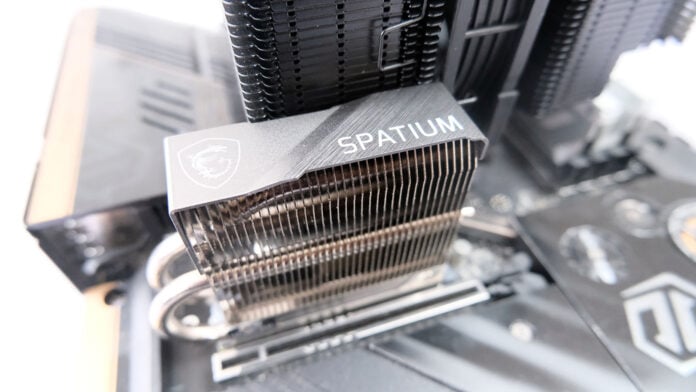There are many reasons why PCs have improved over recent years. For me, the biggest shot in the arm is the advent of solid-state drives (SSDs). Offering buttery-smooth operation that’s now become commonplace, investing in a high-quality drive ought to be a priority for laptops and regular systems.
Yet SSDs are not all the same. The latest-generation PCIe 5.0 models are built for insane speed. Phison remains the go-to supplier on the controller front, though SSD-makers are free to choose the NAND that best fits their needs.
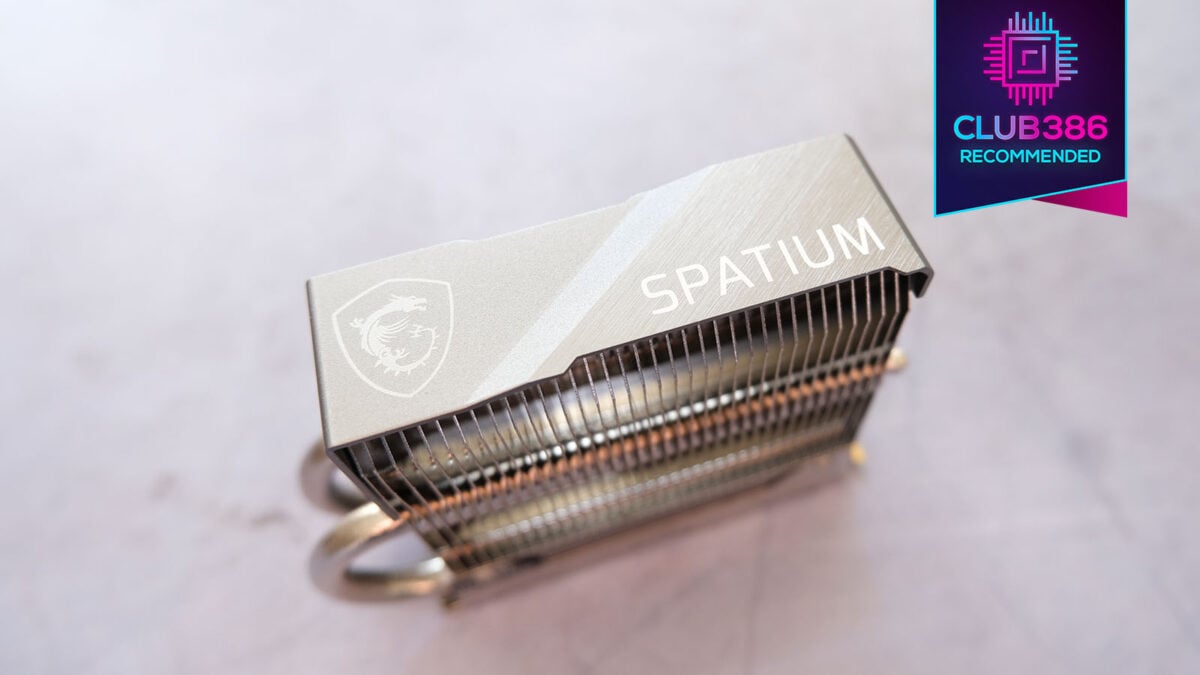
MSI Spatium M570 Pro Frozr 2TB
£300 / $270
Pros
- Supremely quick
- Surprisingly cool
- Passive heatsink
- Up to 4TB capacity
- Five-year warranty
Cons
- No IOPS listed
Club386 may earn an affiliate commission when you purchase products through links on our site.
How we test and review products.
Announced December 2023, MSI jumps on the PCIe 5.0 bandwagon with two drives known as Spatium M570 and M570 Pro Frozr. Both feature the aforementioned Phison controller and carry integrated heatsinks, so the major difference is in speed. You see, regular M570 is no slow coach, coming in at up to 10GB/s read and write, but M570 Pro Frozr ups the ante to 12.4GB/s read and 11.8GB/s write. When you’re out to be the fastest, every byte counts.
Specifications and Analysis
| MSI Spatium M570 Pro Frozr | 1TB | 2TB | 4TB |
|---|---|---|---|
| Controller | Phison E26 | Phison E26 | Phison E26 |
| NAND | 232L Micron TLC | 232L Micron TLC | 232L Micron TLC |
| DRAM | 2GB | 4GB | 8GB |
| Interface | PCIe 5.0 x4 | PCIe 5.0 x4 | PCIe 5.0 x4 |
| Sequential Read Speed (MBps) | 11,700 | 12,400 | 12,400 |
| Sequential Write Speed (MBps) | 9,500 | 11,800 | 11,800 |
| Random Read IOPS (K) | NA | NA | NA |
| Random Write IOPS (K) | NA | NA | NA |
| Form Factor | M.2 2280 | M.2 2280 | M.2 2280 |
| Endurance (TBW) | 700 | 1,400 | 3,000 |
| Hardware encryption | Yes | Yes | Yes |
| Heatsink version | Yes | Yes | Yes |
| Warranty | Five years | Five years | Five years |
| Current price | $150 / £130 | $300 / £270 | TBC |
Available in three common capacities that make sense for the enthusiast, the specs unearth an obvious truth insofar as the combination of Phison E26 controller and 232-layer Micron NAND is a common one. The Adata Legend 970, Aorus Gen5, Corsair MP700, Crucial T700, amongst others, use an identical setup. One would expect minor differences in performance between models due to cooling and firmware revisions.
Bear in mind that even the review drive’s impressive throughput does not represent the bleeding edge for MSI’s storage ambitions. Showcased at CES 2024 this year, plans are afoot to launch an M580 drive with an (even) bigger cooler and 14GB/s bandwidth. Yikes.
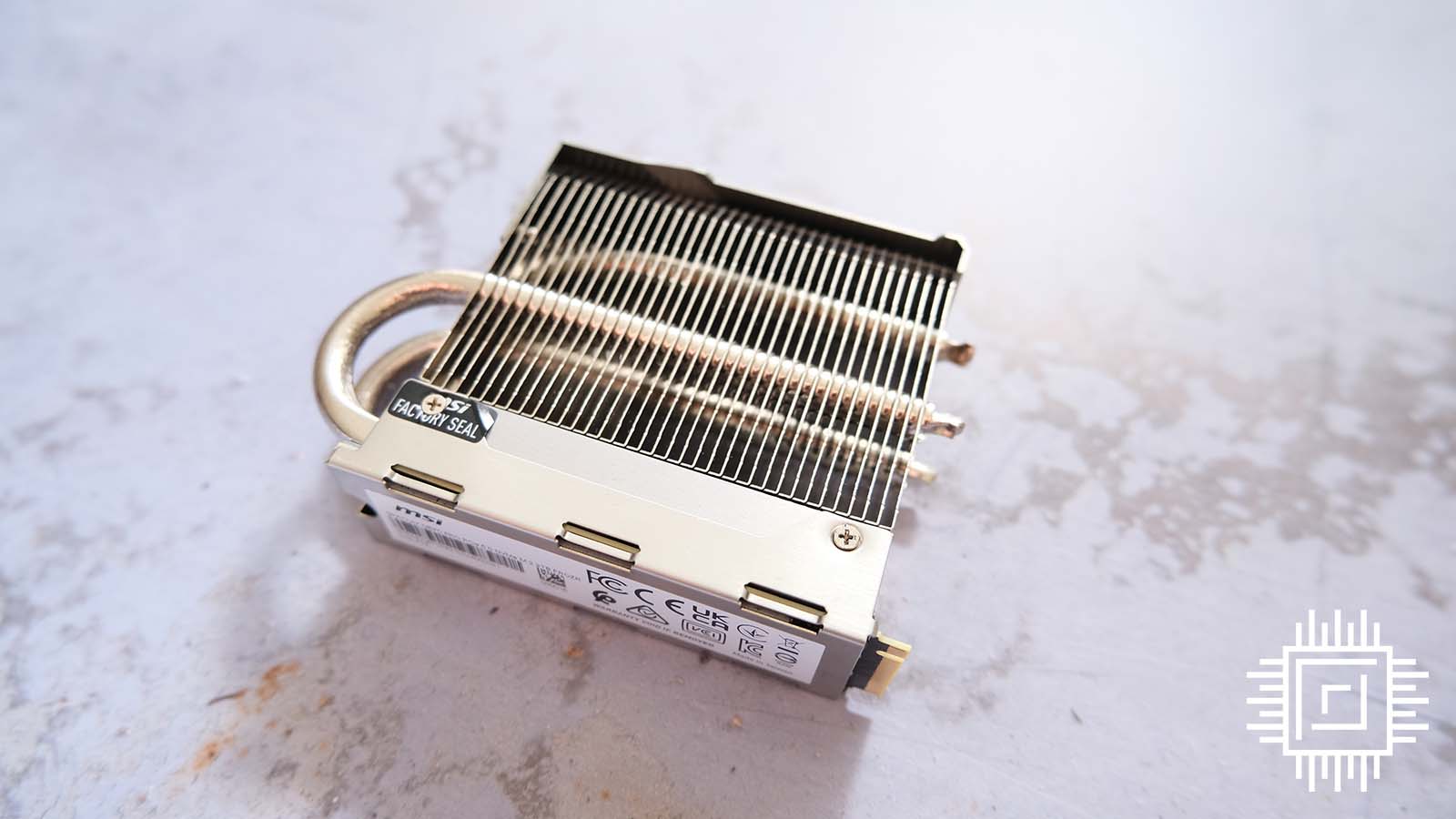
Big Beast
Understanding that the latest slew of SSDs introduces more power and heat into the mix, almost all PCIe 5.0 x4 vendors supply drives with some form of cooling. MSI’s solution opts for the passive approach, and there’s plenty to be said for removing distracting fans from the equation.
The drive itself conforms to a standard 2280 form factor common on almost all motherboards. Of course, you’ll have to remove the board’s dedicated M.2 cooling. Nevertheless, I recommend installing in a slot that can also accommodate longer 22110 drives. The reason for this is it enables more room around the slot for MSI’s extravagant cooling.
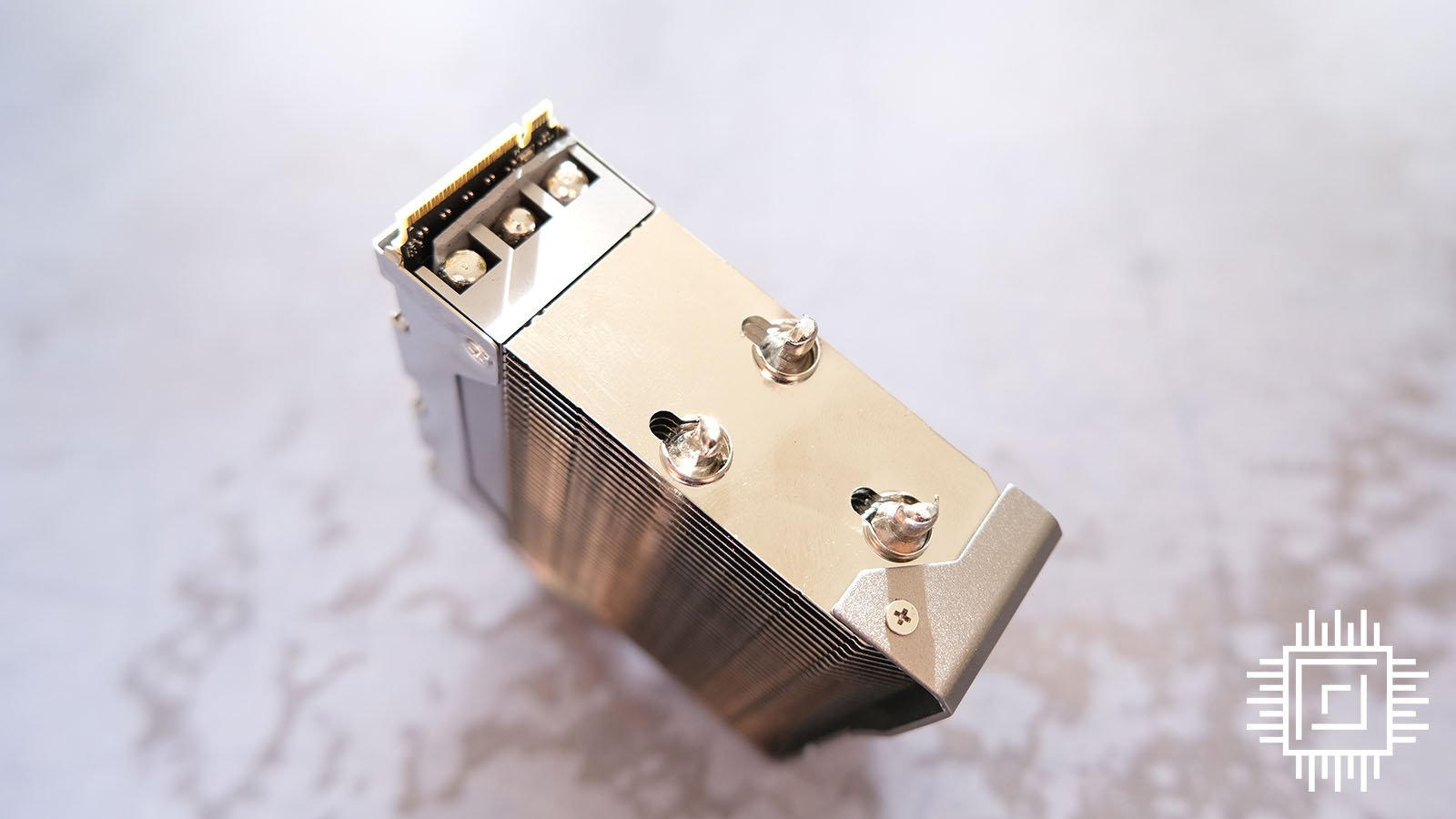
Spatium M570 Pro Frozr doesn’t take any chances in the thermal department. No, sir. Three flattened heatpipes wend their way from a thermal pad and through, by my reckoning, 36 aluminium fins. Topped with Spatium branding, it’s a fine-looking behemoth.
Standing 72mm tall, I’d expect the fin-stack to receive indirect cooling from graphics card, CPU cooler fan(s), and front-mounted chassis spinners. General airflow will dictate how well the heatsink performs, but considering the underlying drive has a maximum power consumption of 11.5W, I can’t imagine temperature will be an issue. In fact, an enthusiast-grade VRM heatsink, common on decent motherboards, ought to do the job in this instance.

Extravagant Cooling
The chonky cooling increases total drive weight to 138g for the 2TB review model. It goes without saying but I’m going to say it anyway; you can’t use this drive for a PlayStation 5 unless you manually disengage the heatsink section by removing a few screws. I don’t recommend you do this as there are plenty of other drives, including in MSI’s arsenal, better suited as PS5-extending storage.
For the tech nerds out there, the PCB contains the eight-channel Phison E26 controller, 4GB of SK hynix LPDDR4-4266 DRAM for buffering duties, and four 512GB NAND chips from Micron operating at 2,400MT/s.
Overall specifications are suitably robust, too, with a claimed 12.4GB/s read and 11.8GB/s sequential write that’s on a par with rivals. I’m not sure why MSI is coy in published random IOPS – no figures were provided when I asked company representatives. Going by the competition, expect around 1.5m for reads and writes. MSI also has enough confidence to imbue the drive with a 1,400TBW rating, equating to around 770GB of writing per day over the five-year warranty period.
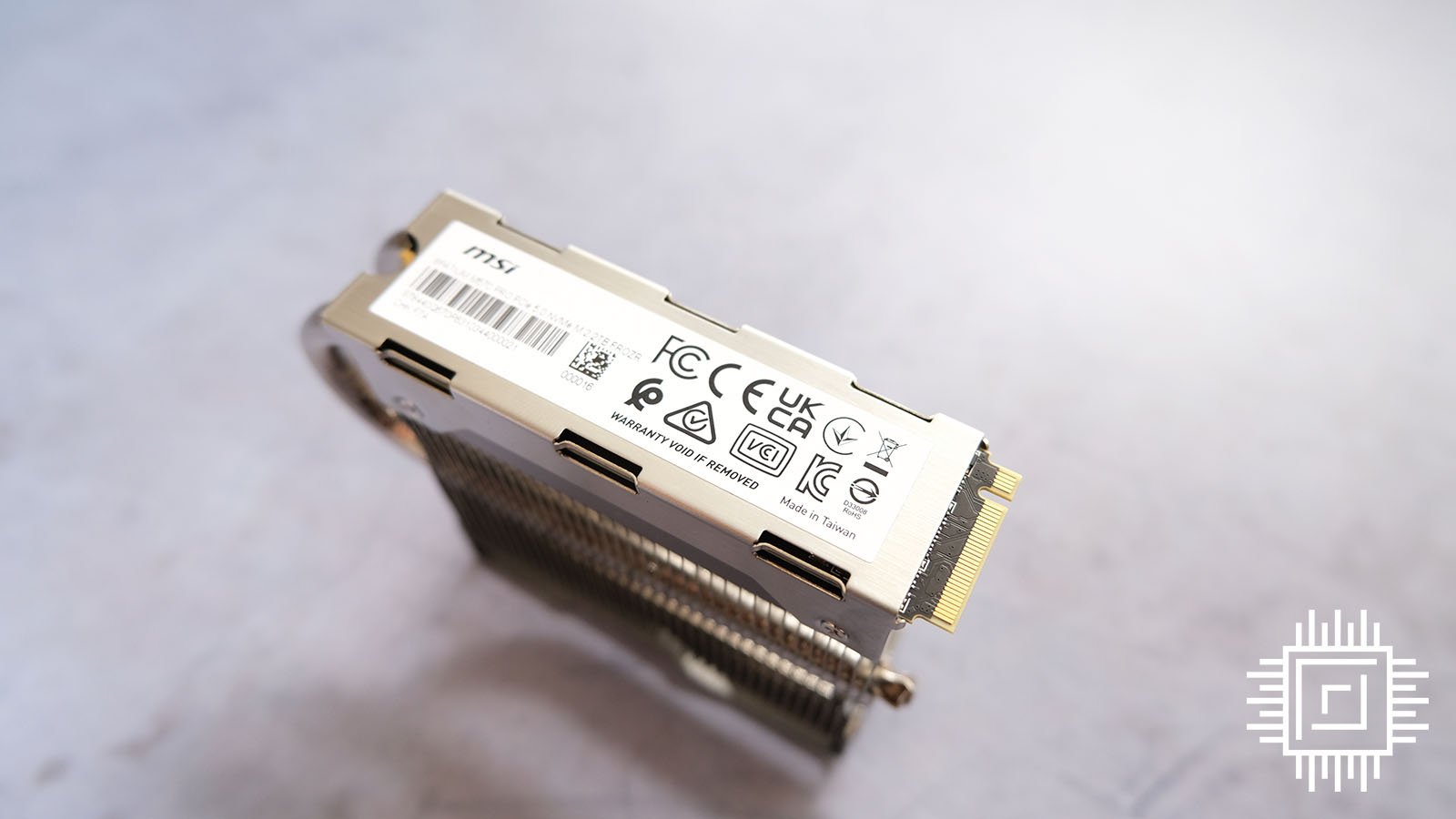
Looking to the far left, there’s the usual crescent PCB cutout for secure fitment. On my sample at least, thermal tape obscures this important section. You’ll need a small screwdriver and a steady hand to get Spatium M570 Pro Frozr in place.
Priced at around $300 / £270, MSI’s approach centres on providing the best zero-noise PCIe 5.0 x4 SSD solution out there. Tested on an ASRock X670E Taichi and featuring the latest SSD firmware, let me show you how it plays out.
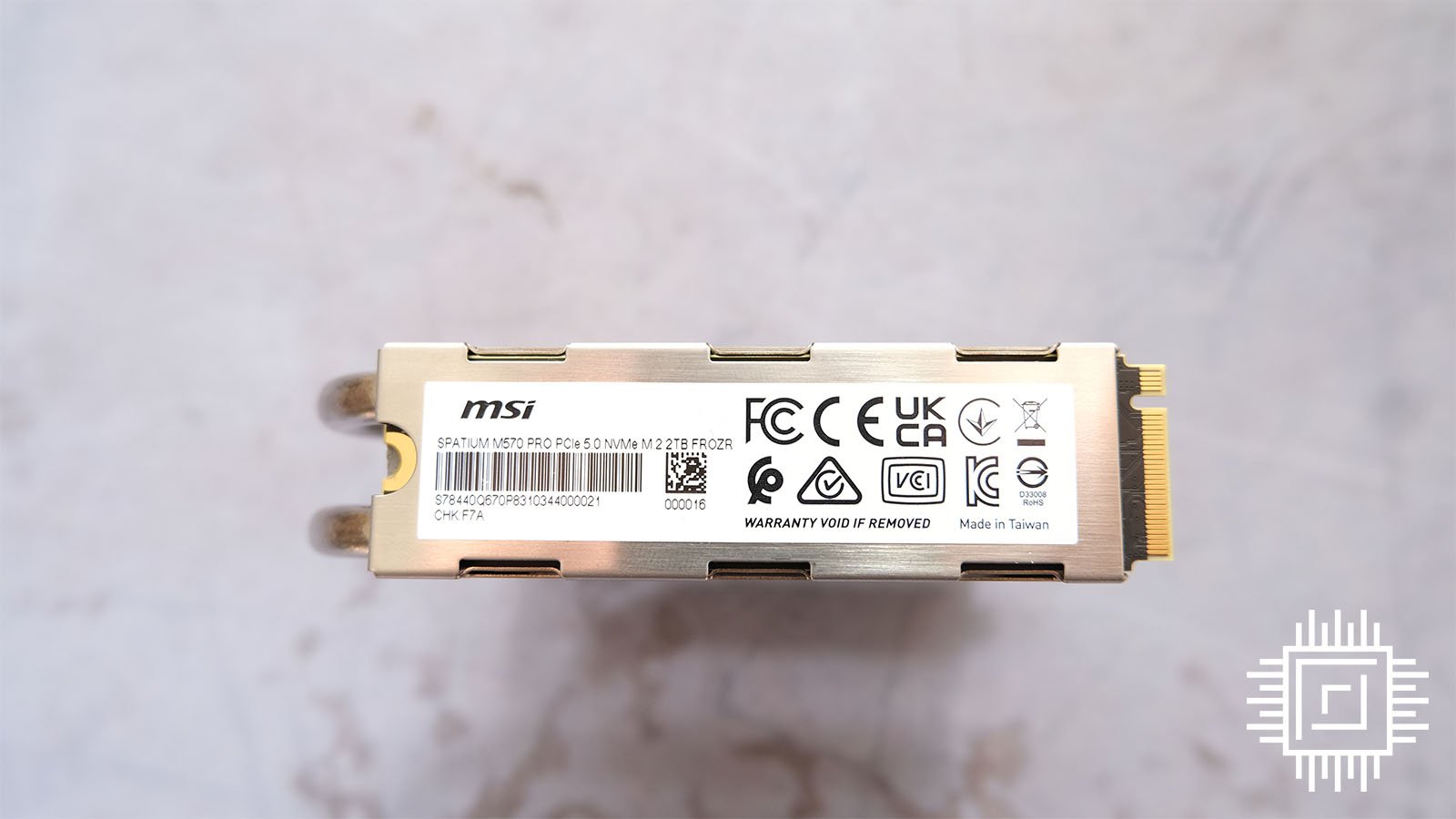
Performance
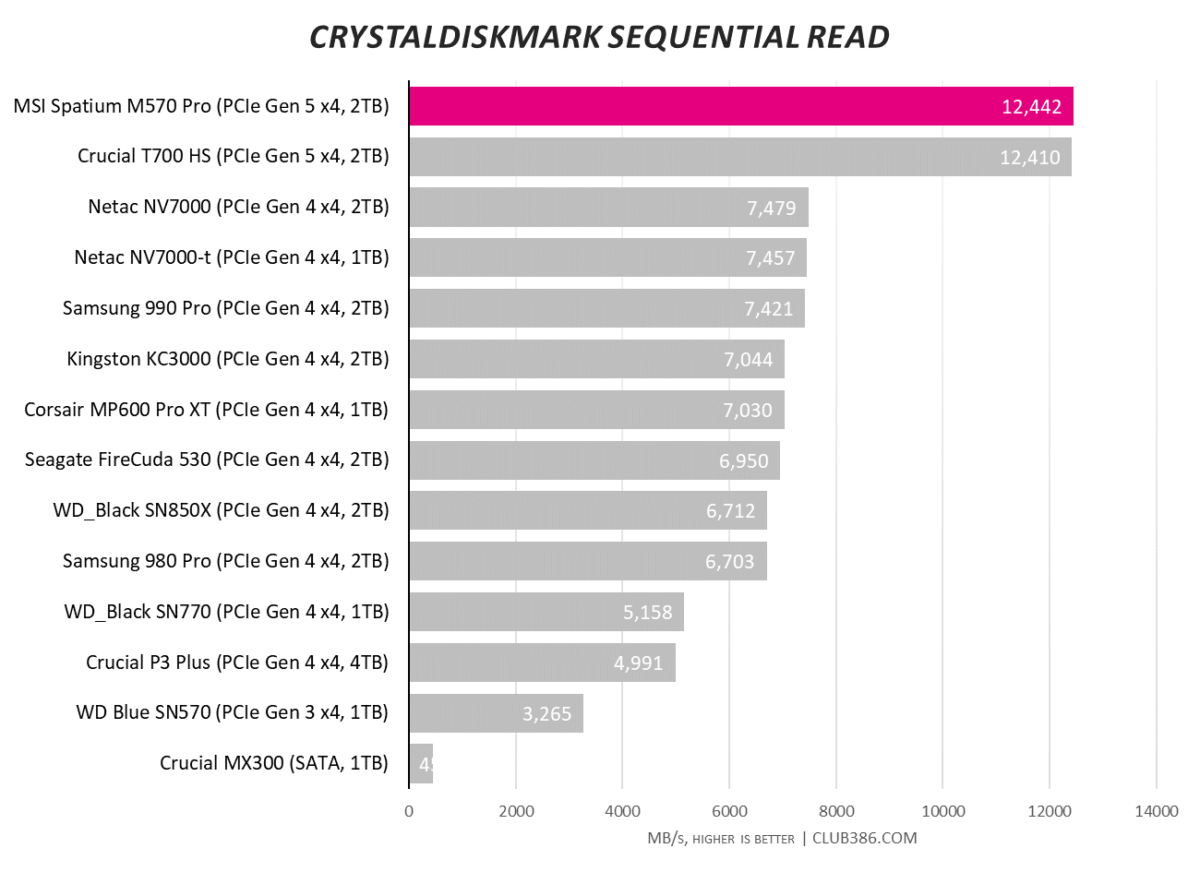
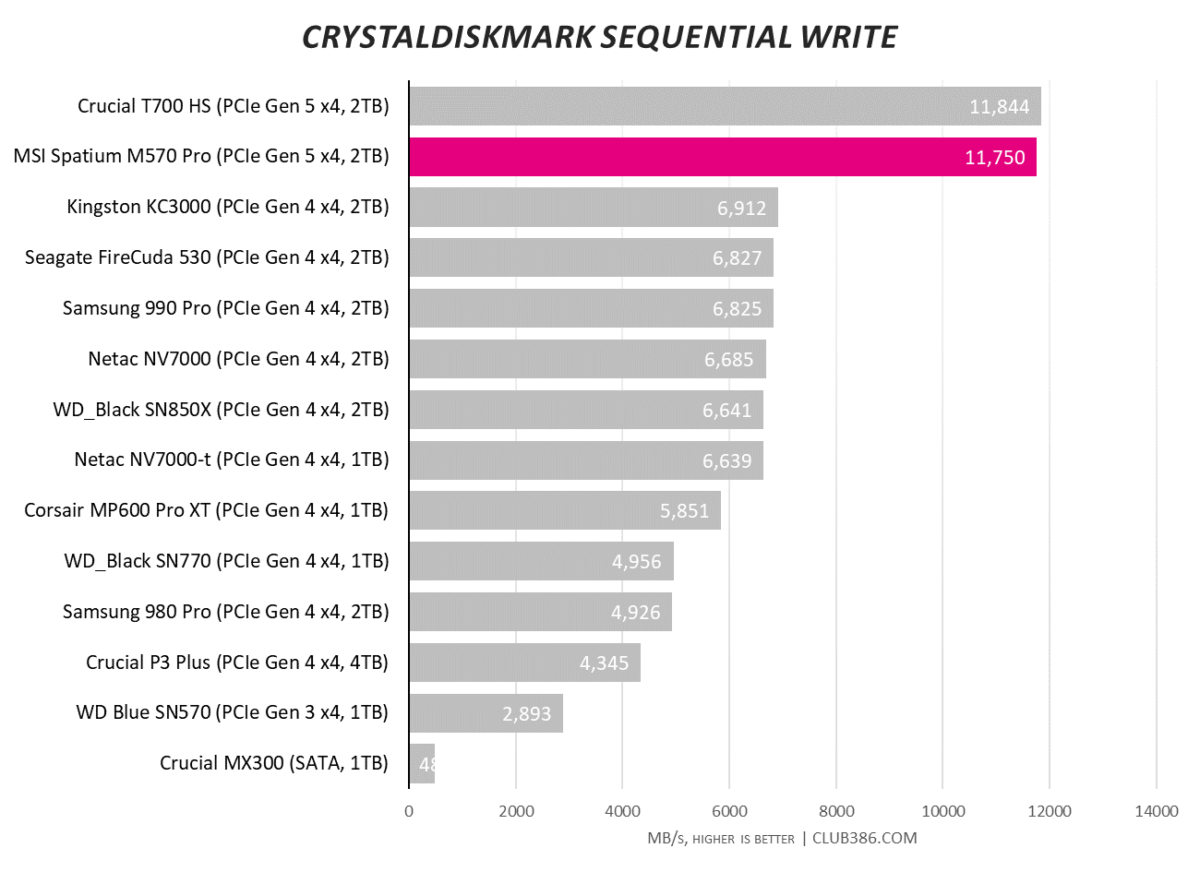
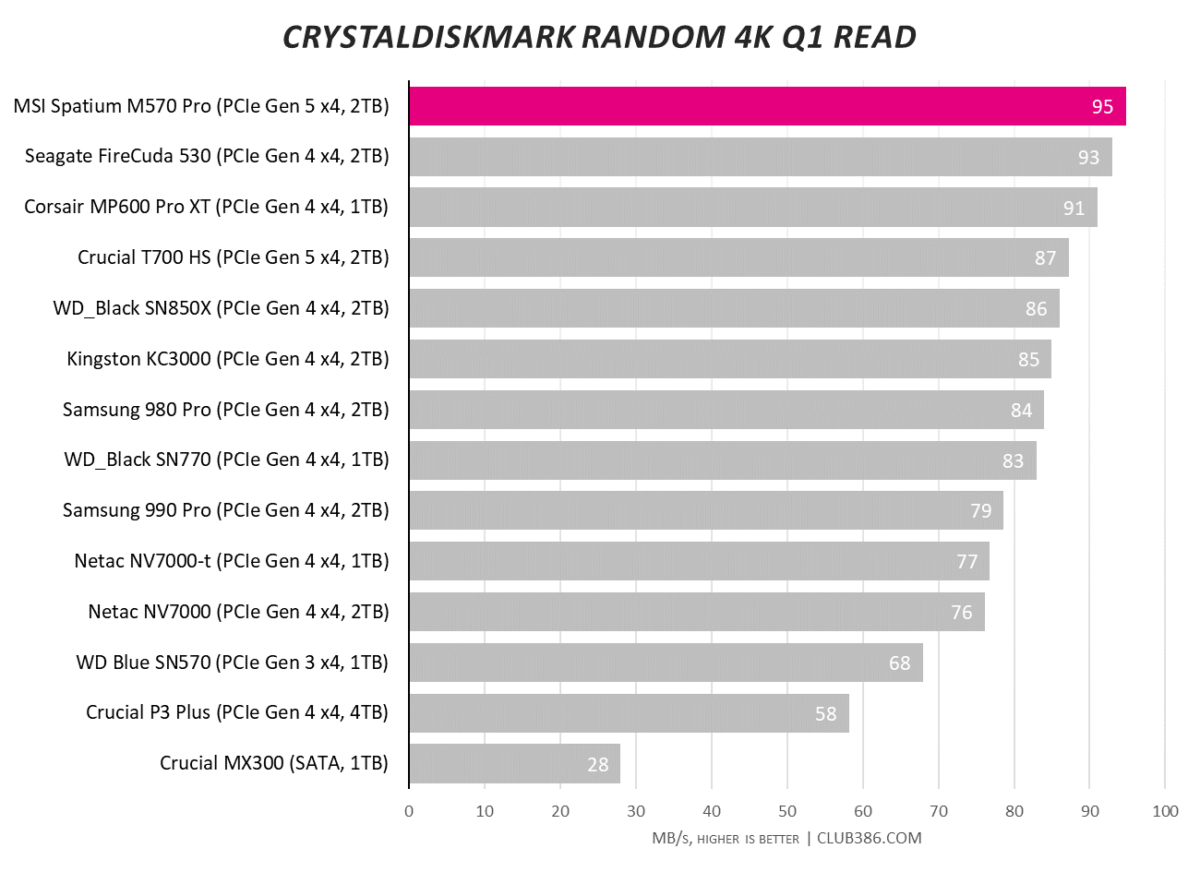
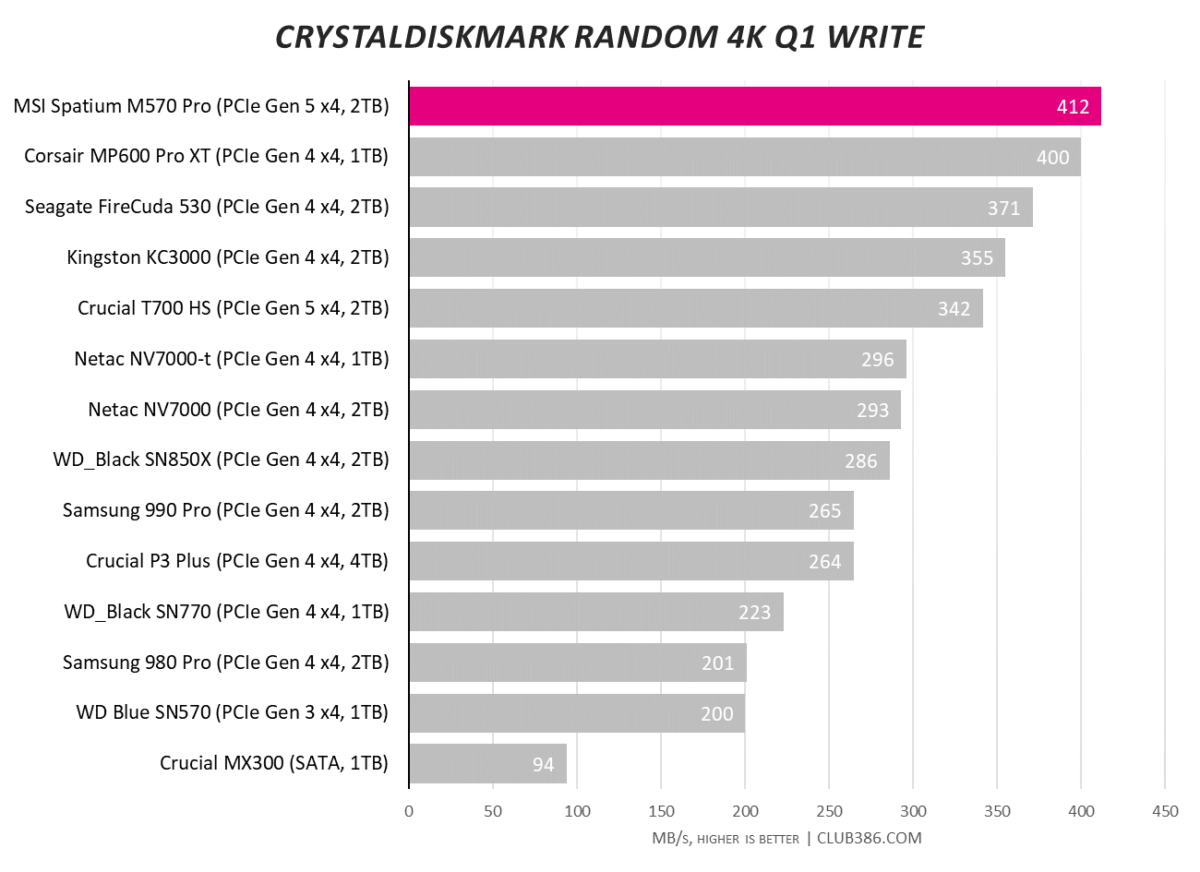
You just know the drive is going to be fast when perusing specifications. The Spatium M570 Pro Frozr doesn’t disappoint.
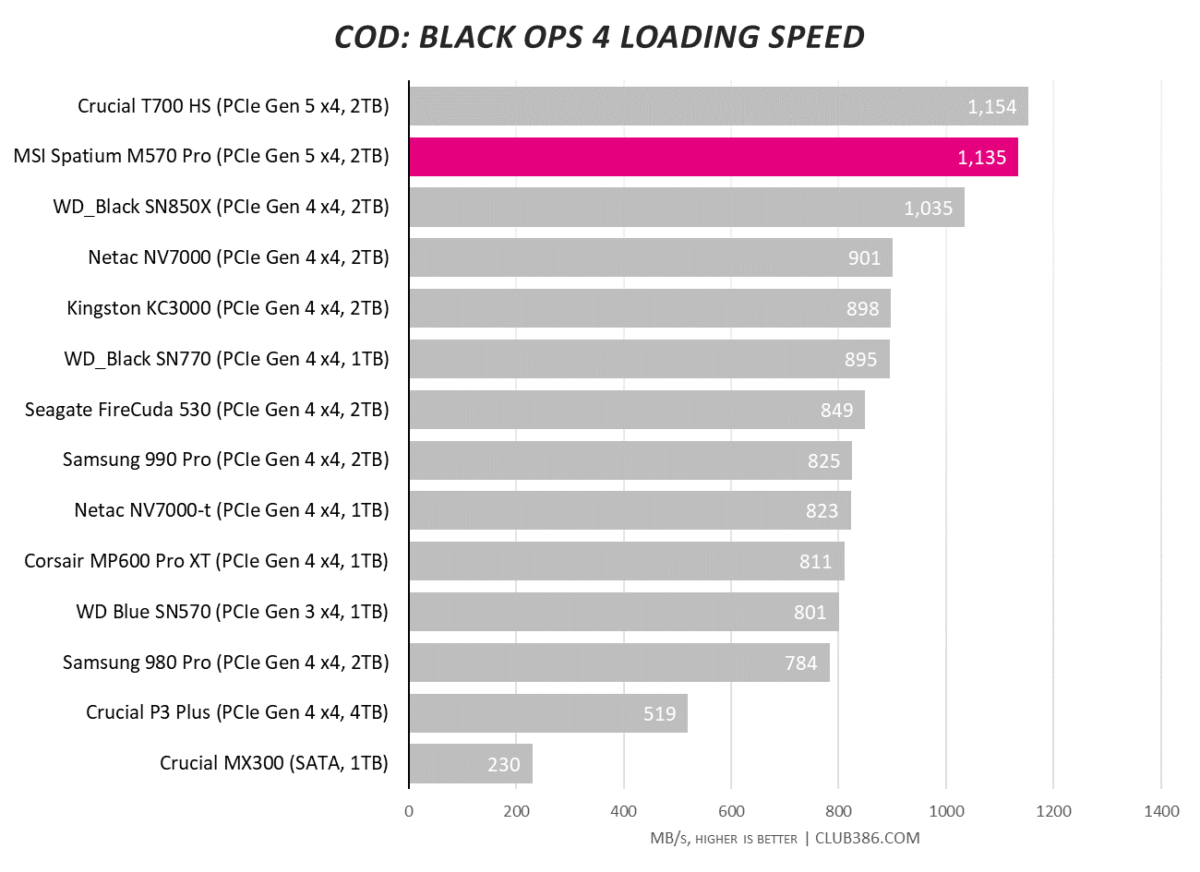
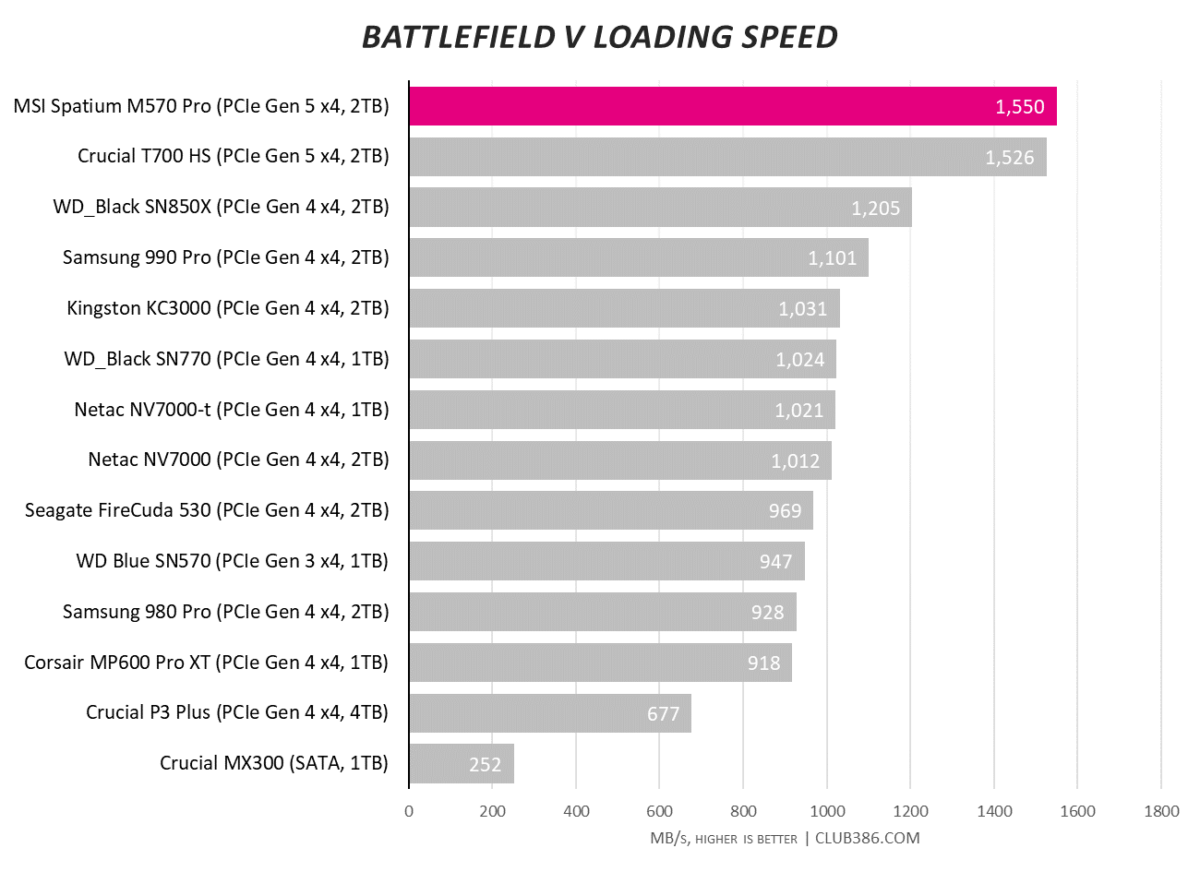
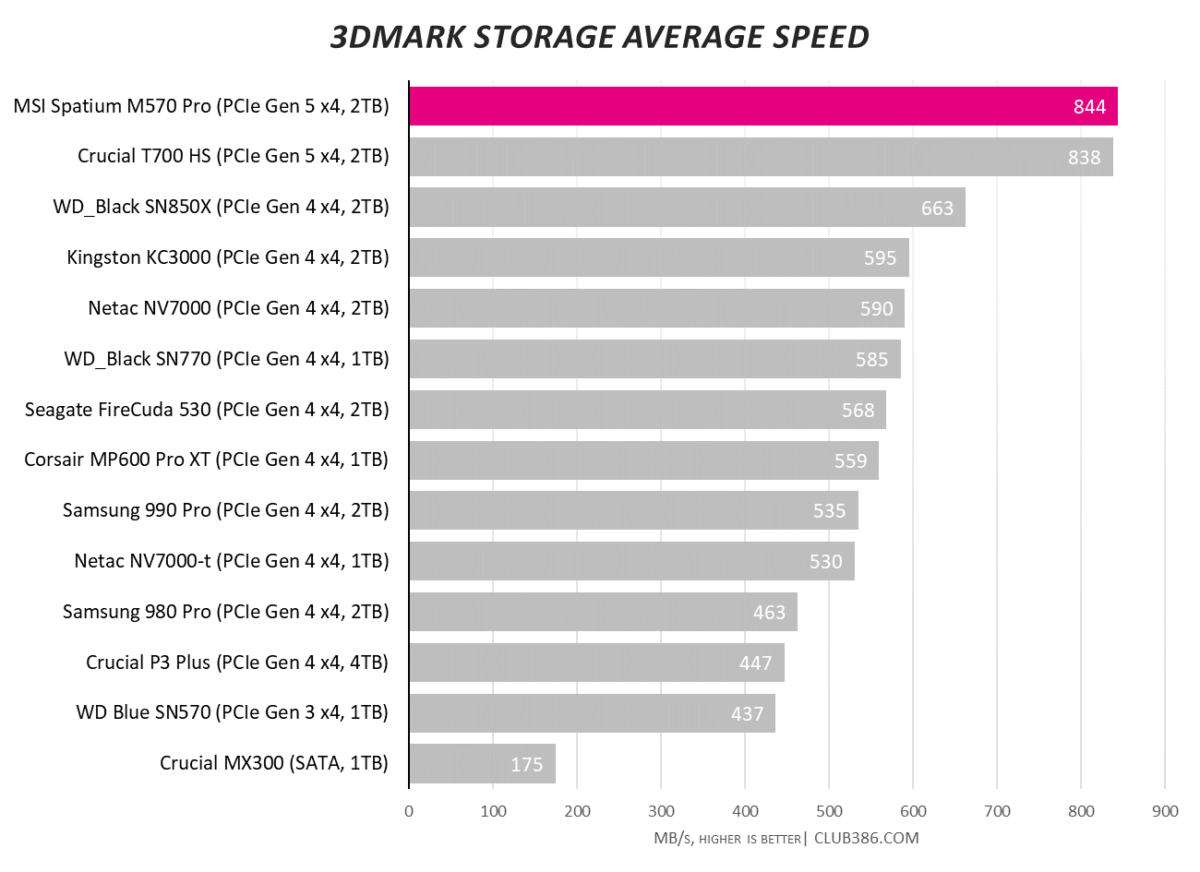
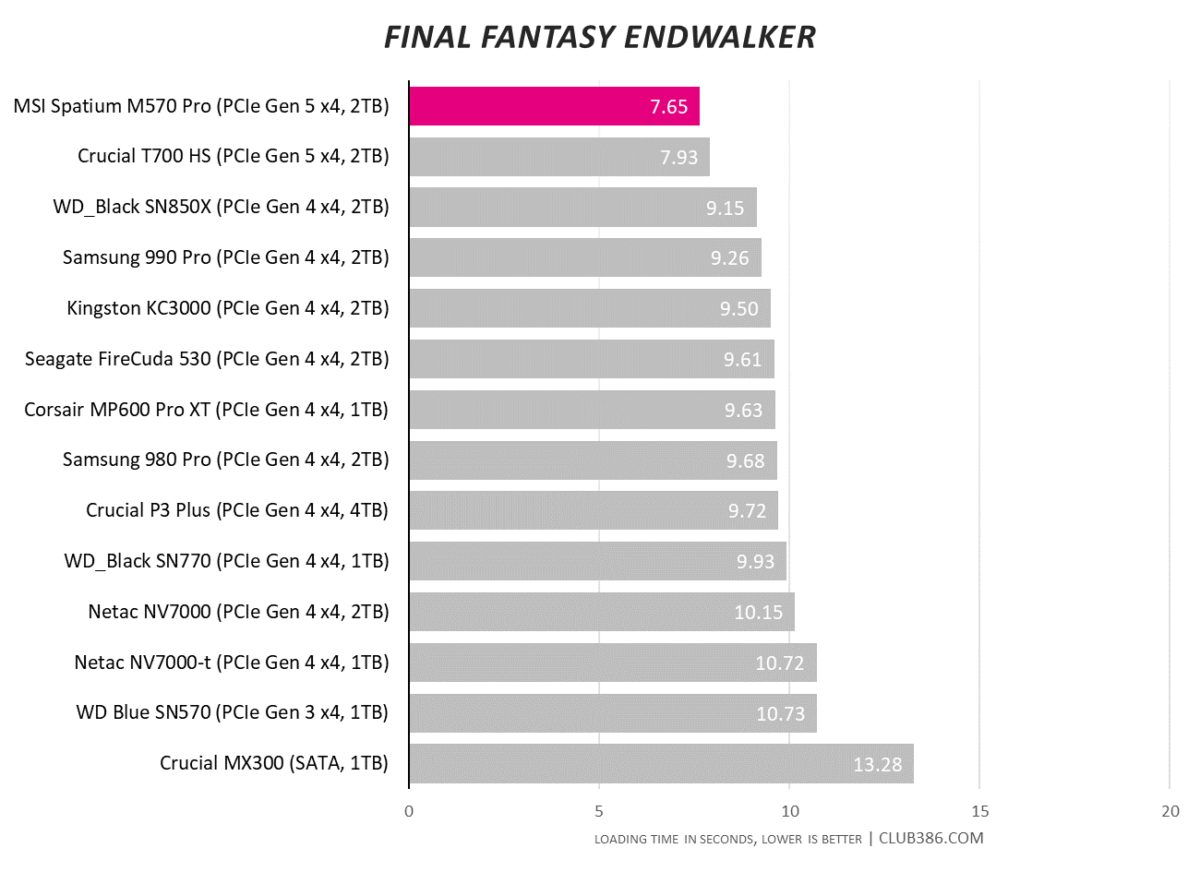
Moving on to games, leadership is neck and neck between this drive and the near-identical Crucial T700 HS.
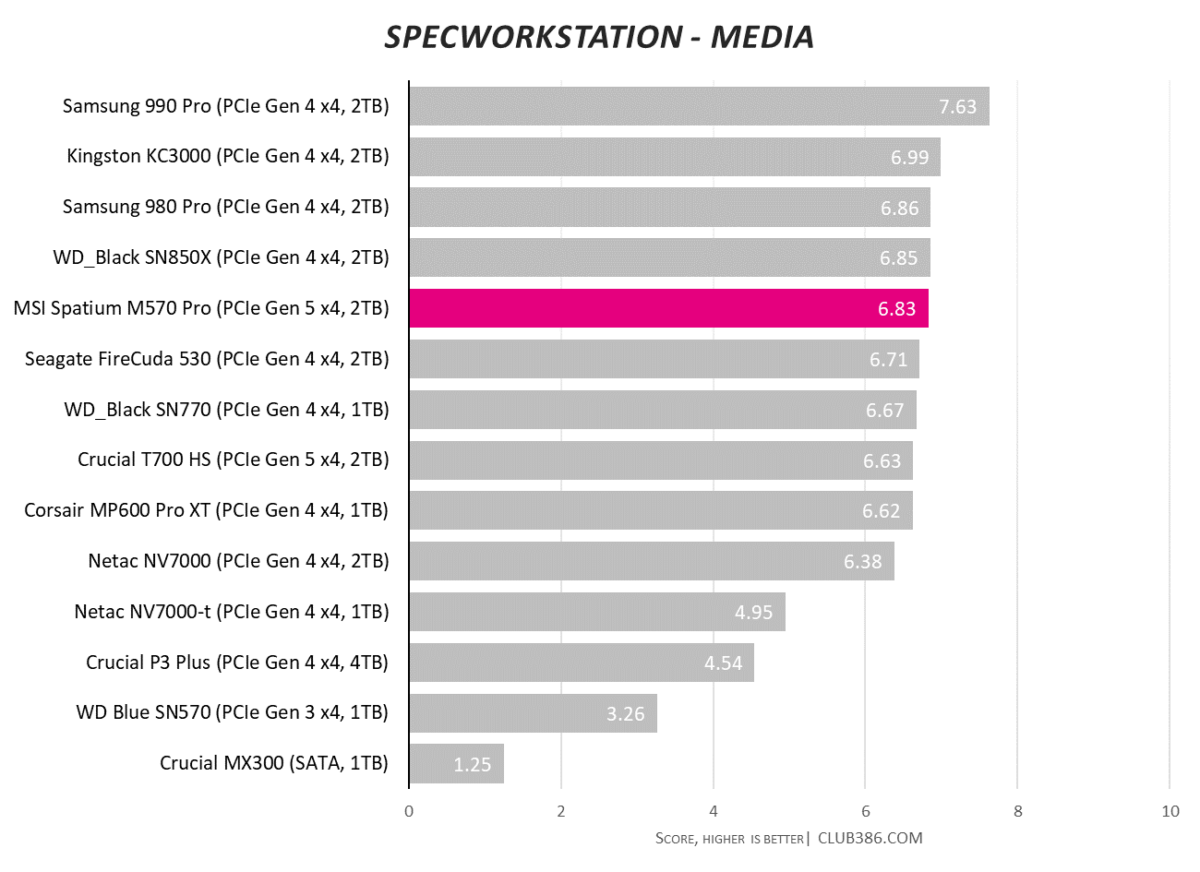
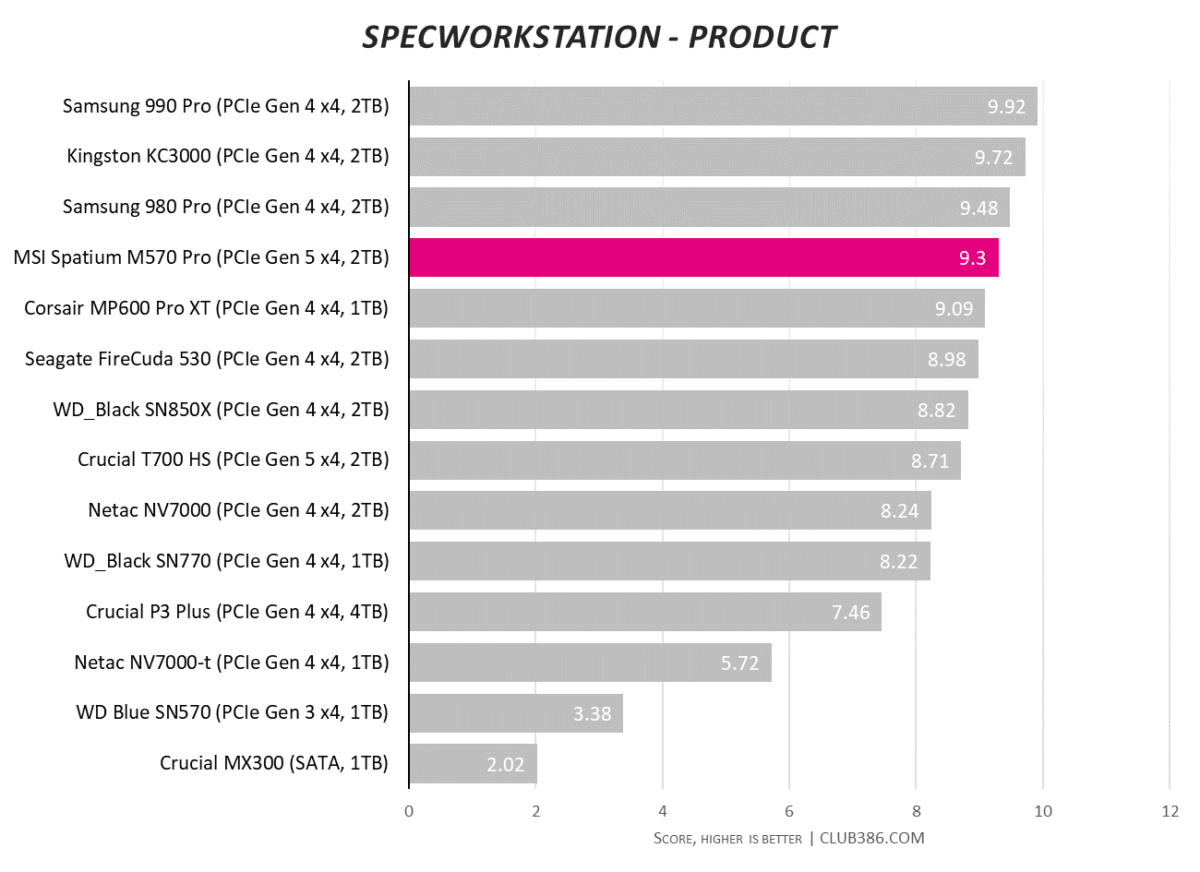
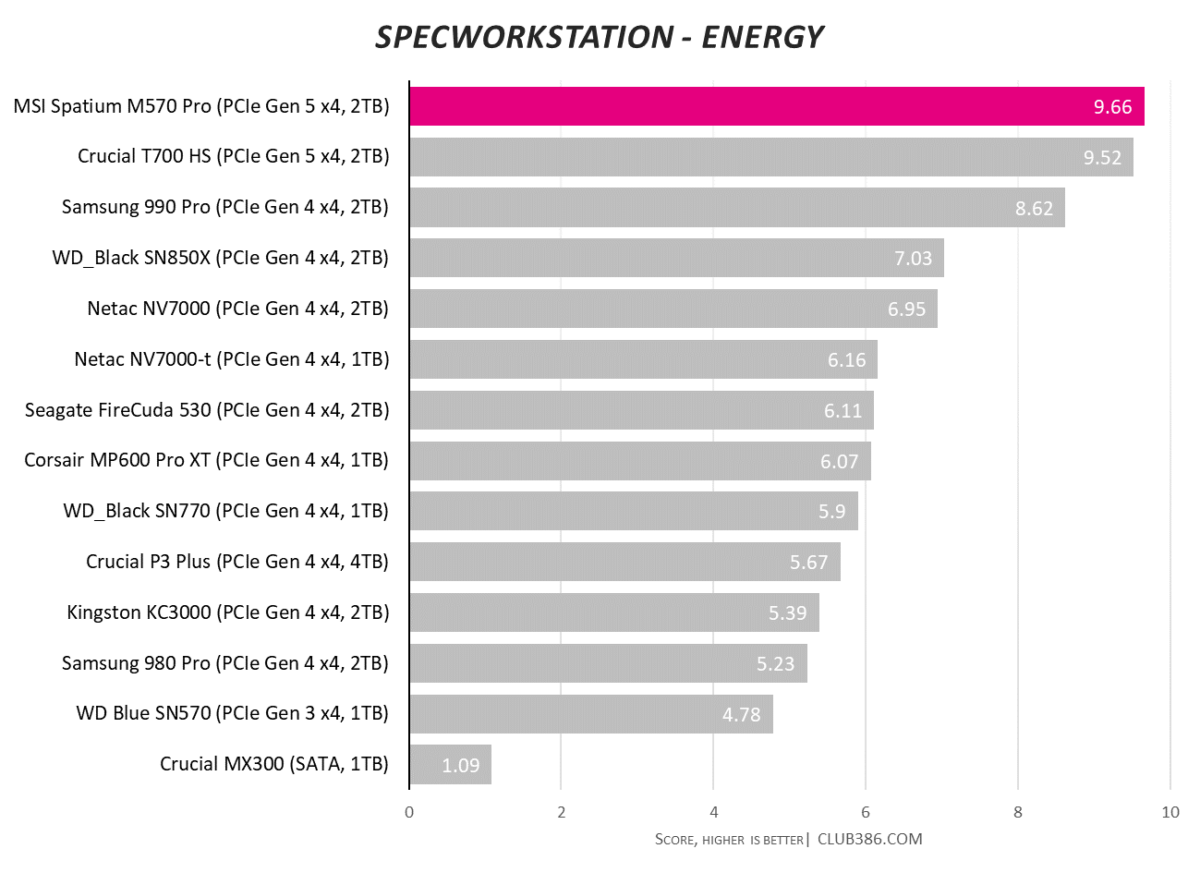
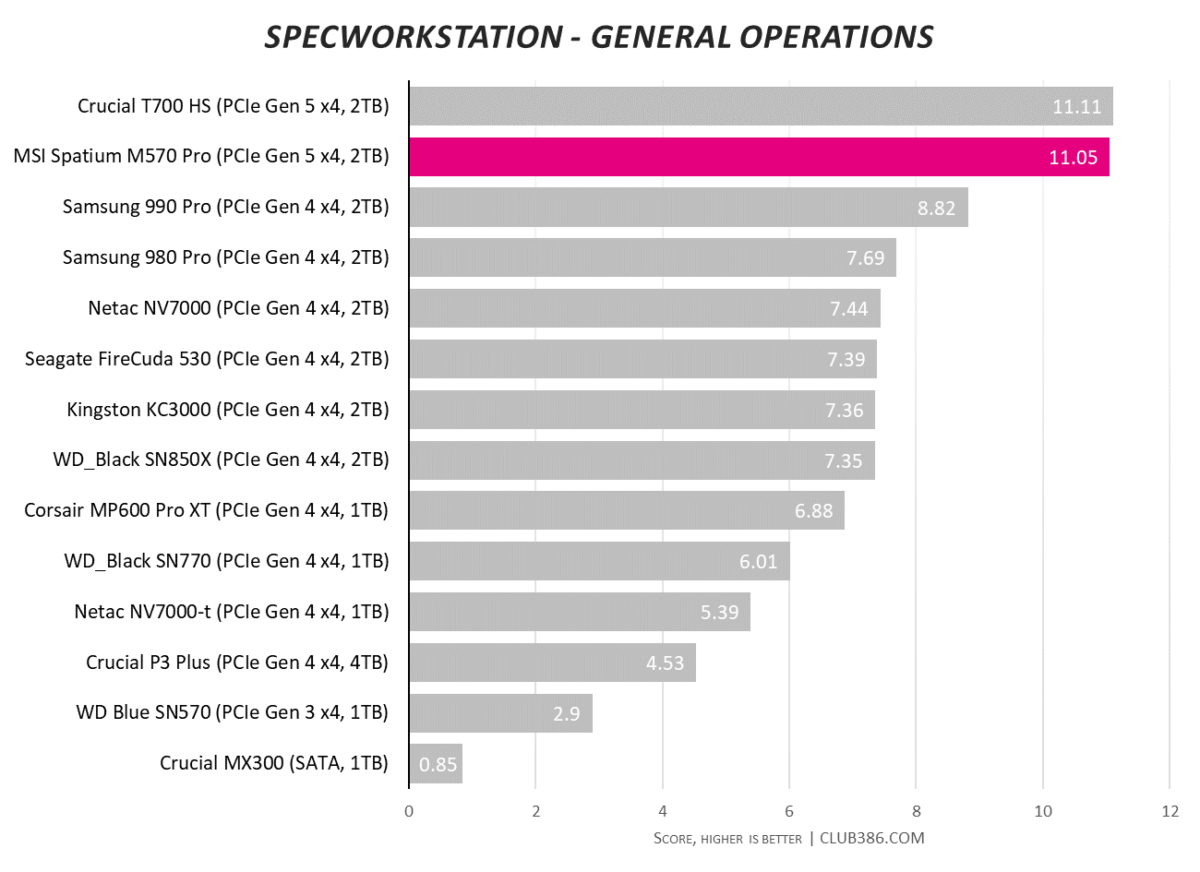
It’s often the case that more rigorous benchmarks separate the wheat from the chaff. I’m somewhat surprised PCIe 5.0 x4 drives don’t boss all the benchmarks. Perhaps there’s not enough parallelism in the applications to take advantage of the sheer innate speed. Yet more often than not, the MSI puts up a good showing.
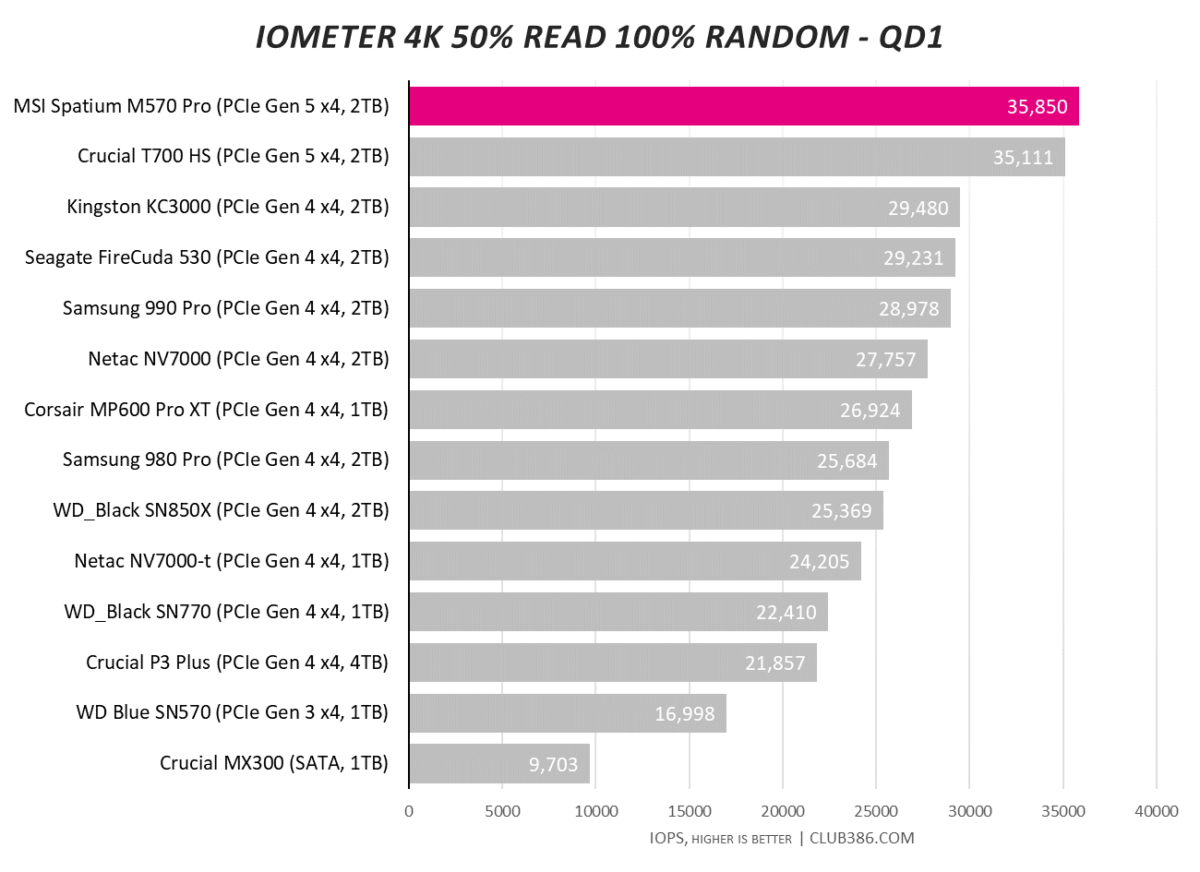
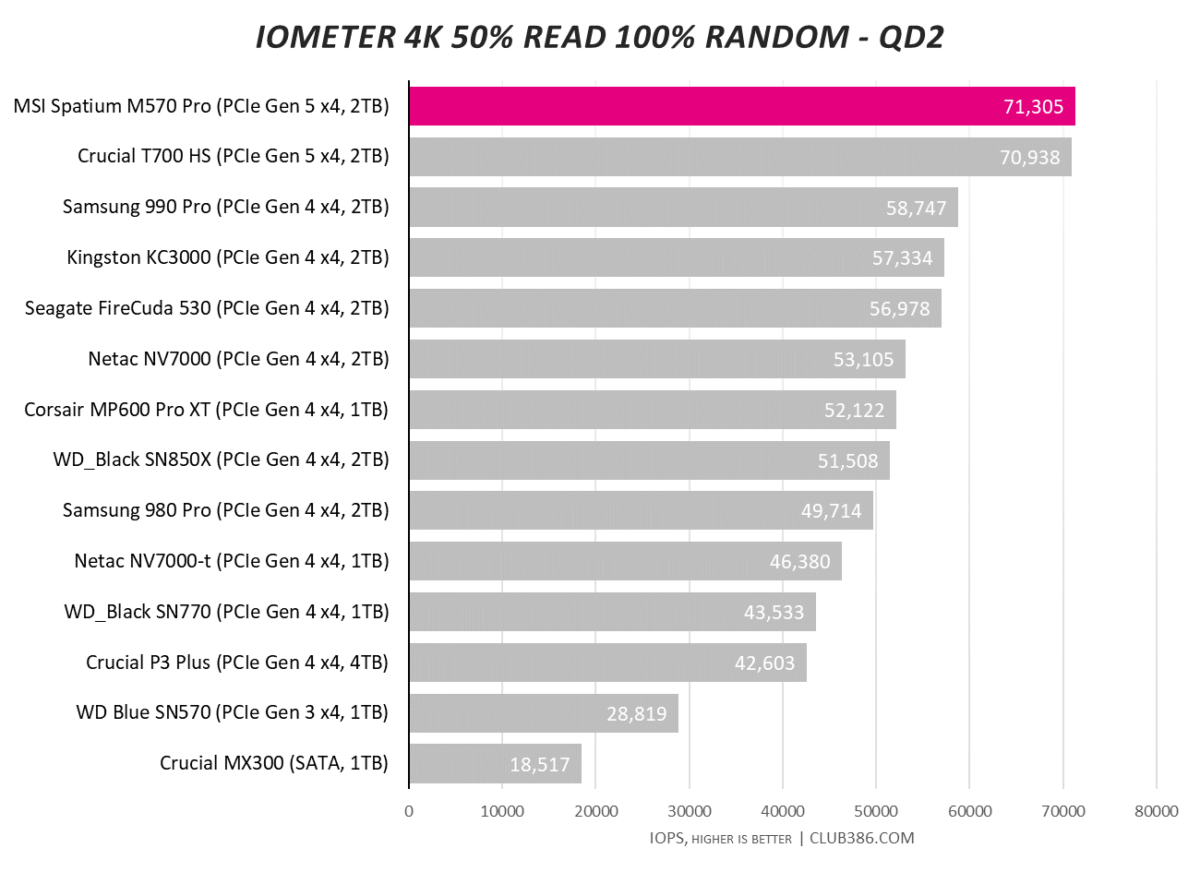
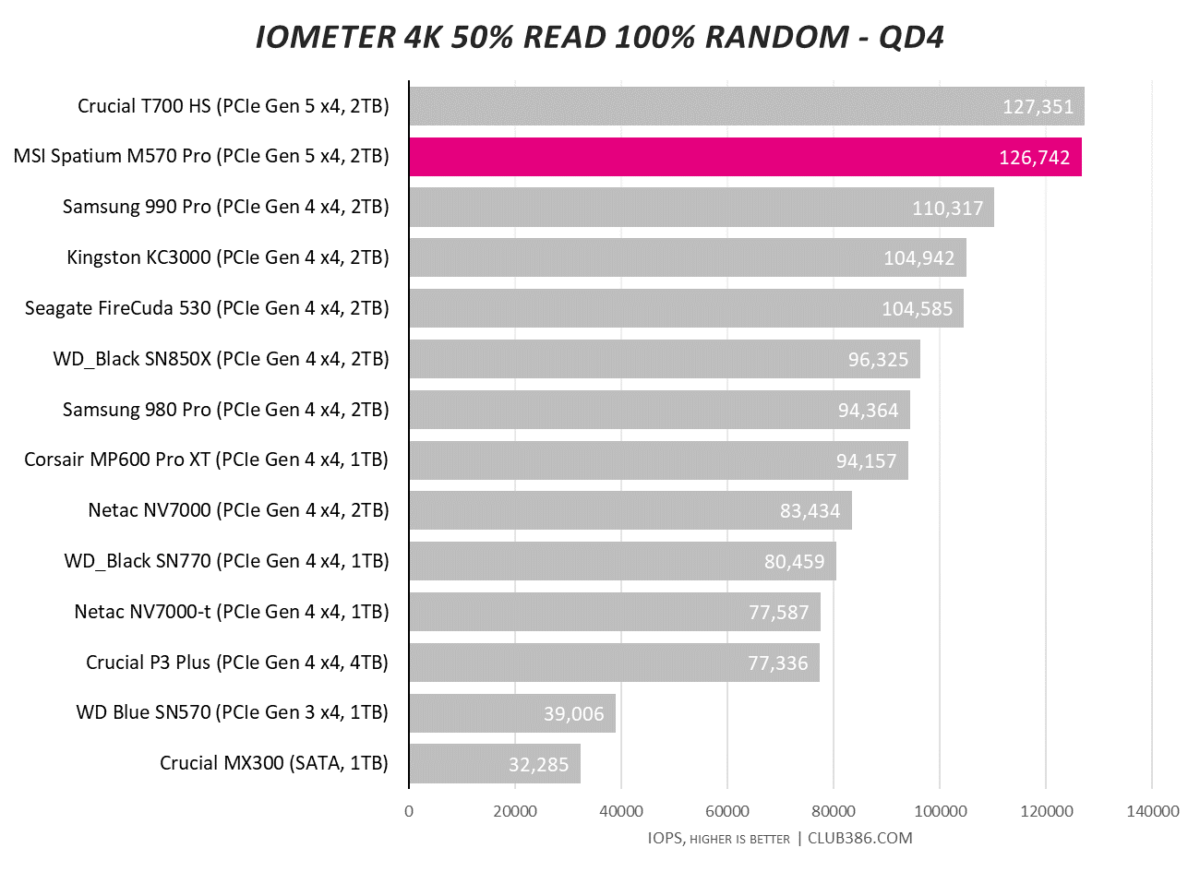
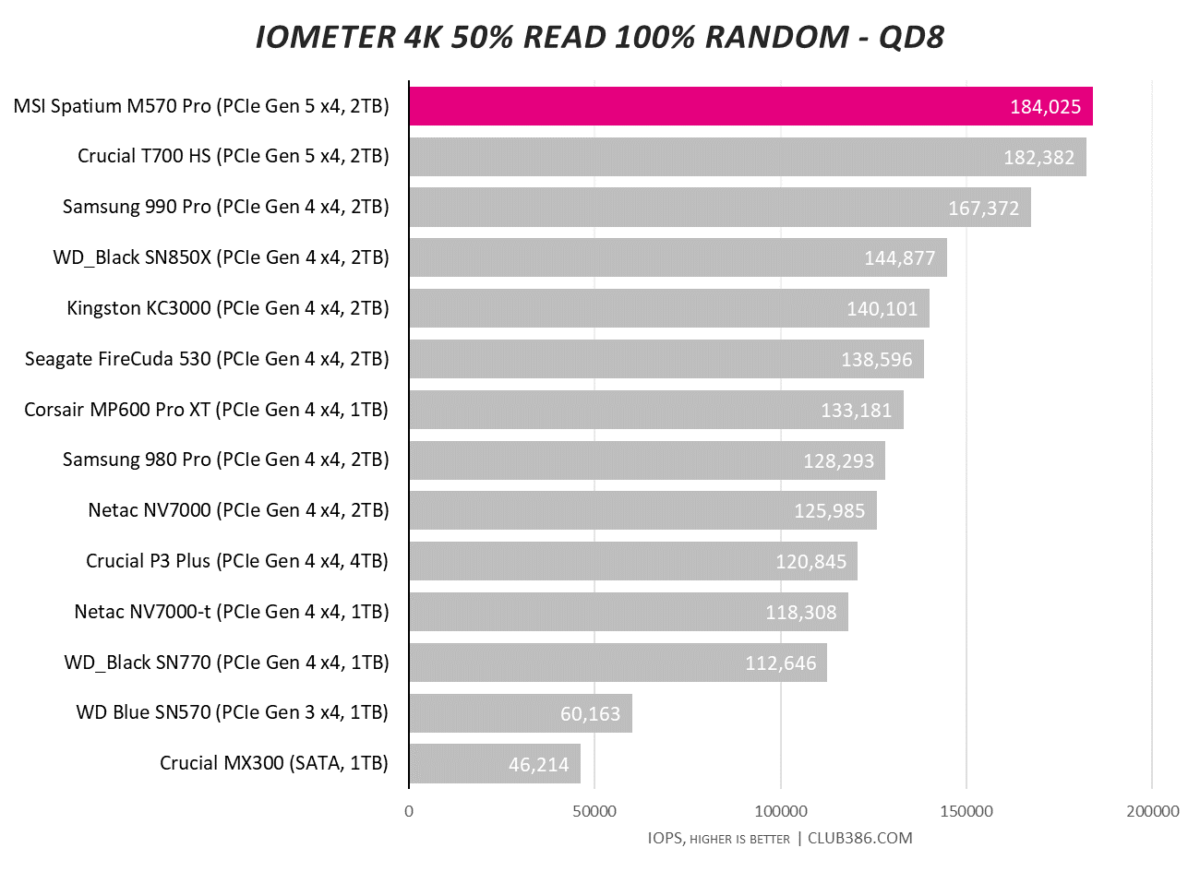
This is more like it. PCIe 5.0 x4 SSDs strut their considerable stuff in Iometer. If you’re a consumer with a penchant for running intensive storage workloads, a premium model is certainly worth it.
Like most drives, the TLC NAND can act as much faster SLC cache for frequently used data. This pseudo SLC cache fills up at around the 200GB mark, which is plenty enough for most transfers.
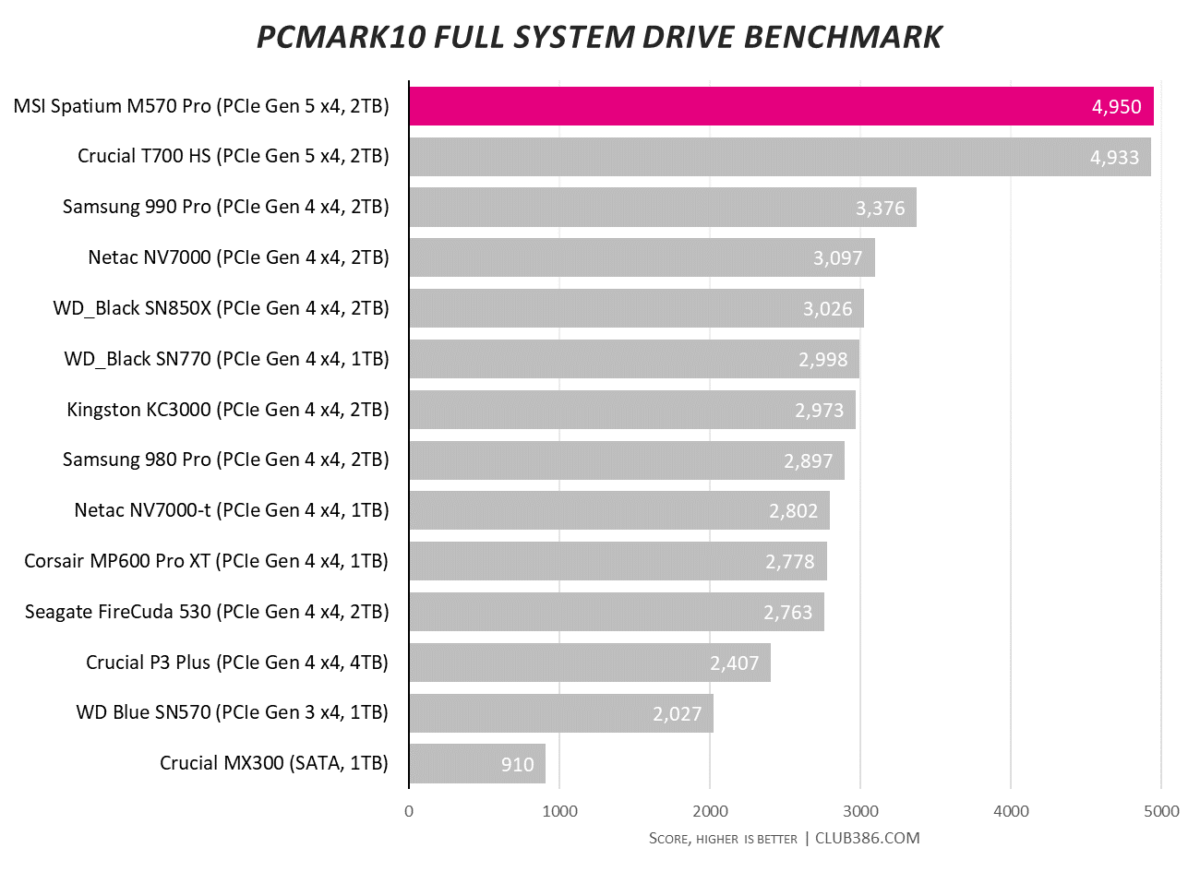
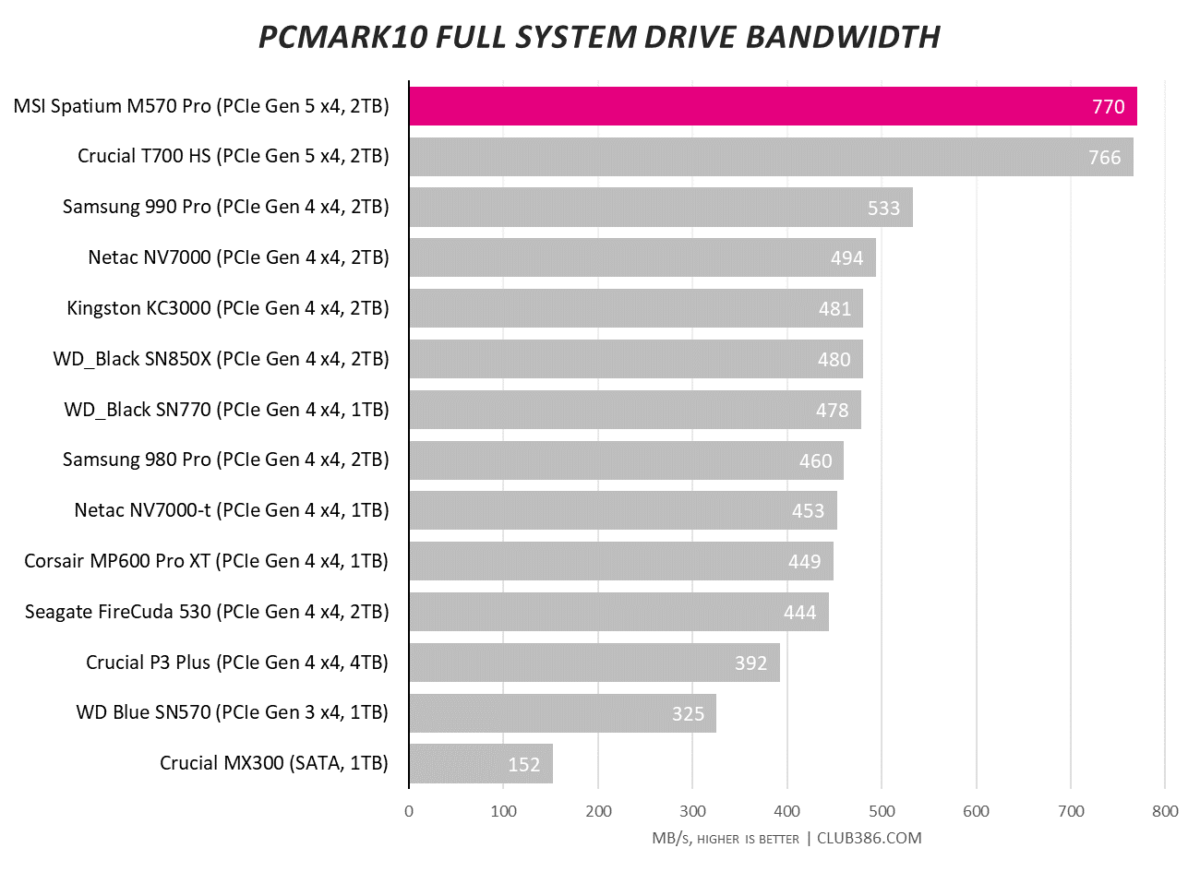
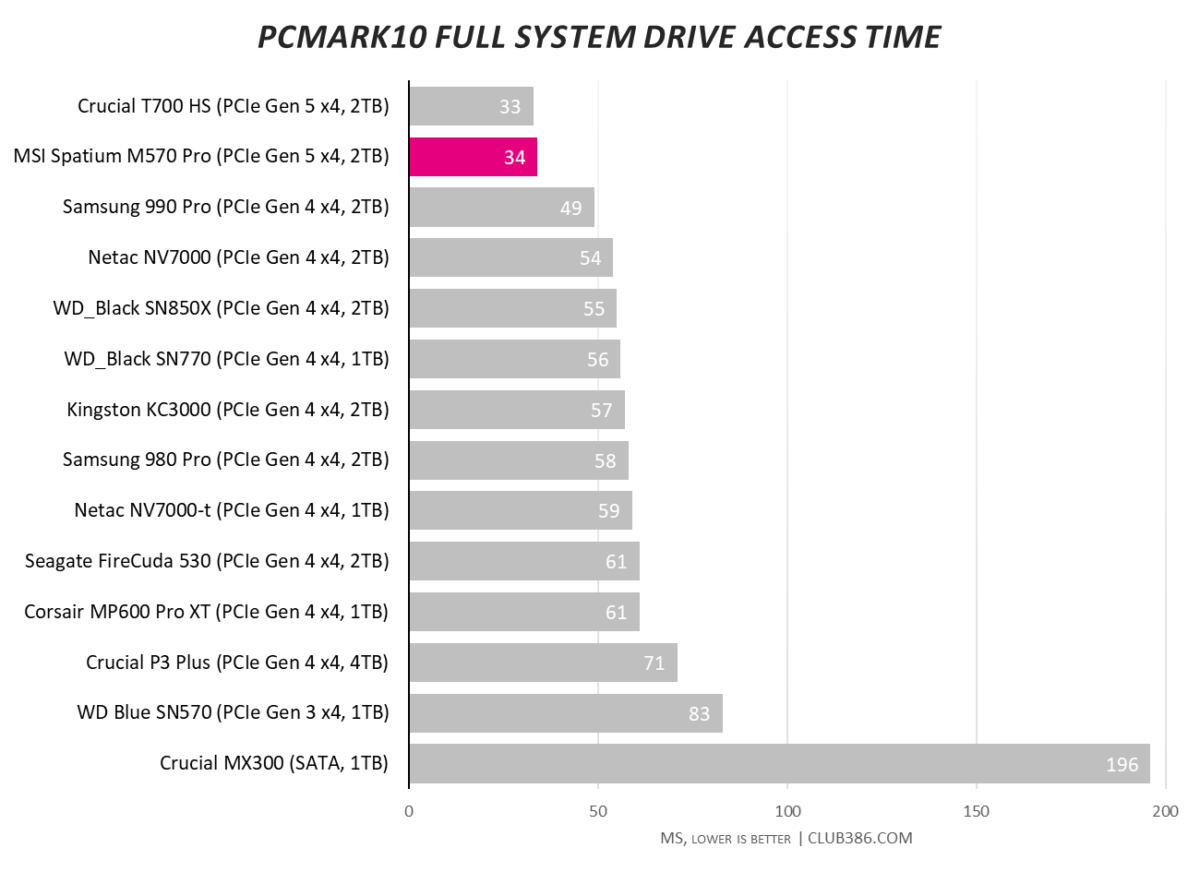
Running the most tortuous test last, MSI’s champion drive continues an impressive run of results.
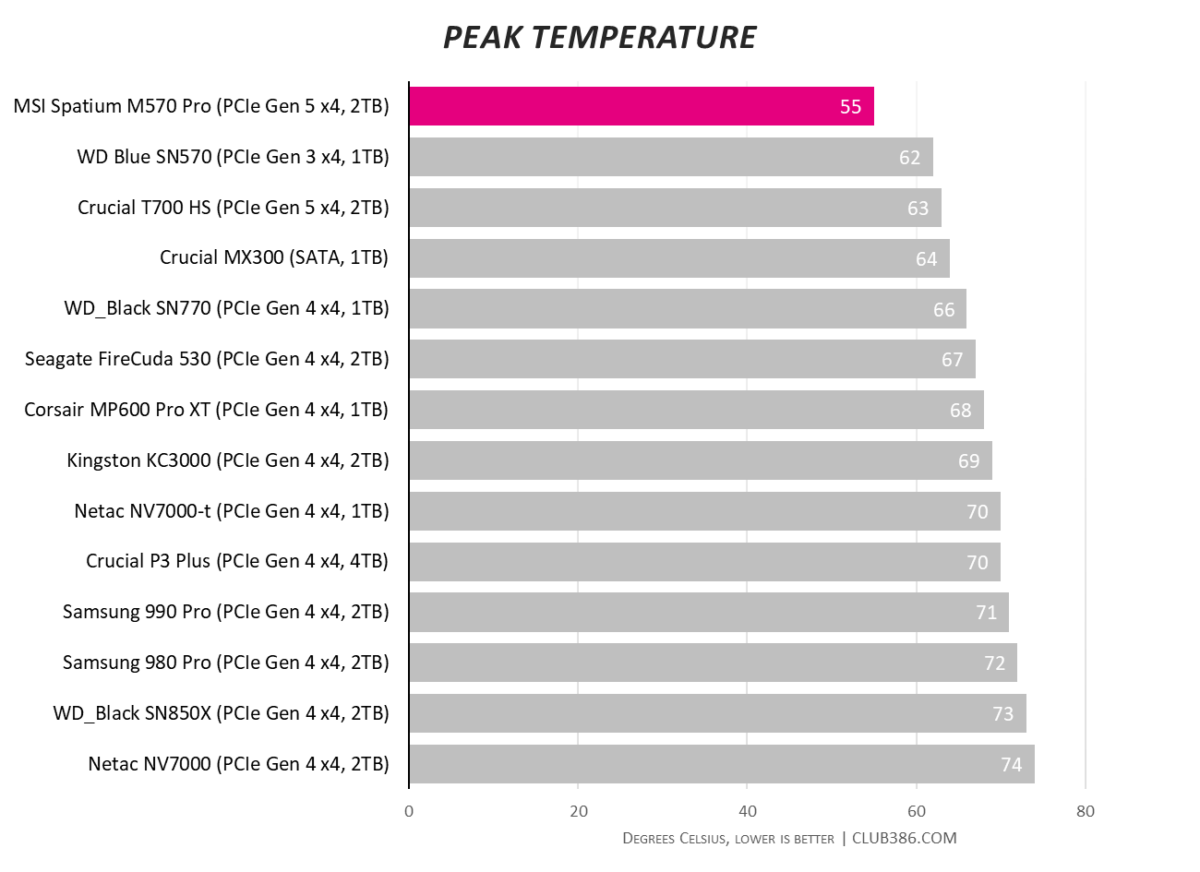
I’m sure you were wondering if over-the-top cooling is worth it on a consumer SSD. Evidently so, as the 55°C under-load temperature is, by far, the lowest I’ve seen. Furthermore, I noticed no thermal throttling in any benchmark. Good stuff, MSI.
Conclusion
Turbocharging a modern PC takes many forms. One of the easiest is to opt for a cutting-edge SSD offering blistering performance. MSI’s latest Spatium M570 Frozr drive does exactly that.
Built with the proven Phison controller and Micron NAND, straight-line speed is fantastic. Sweetening the deal, MSI’s capable passive cooler keeps the usually hot-running SSD at sedate temperatures cool enough to inhibit throttling.
Of course, value isn’t a strong play, but that’s totally expected from a high-octane SSD of this ilk. Buying advice boils down rather nicely; if you’re after a speedy drive for that dream PC, be absolutely certain to put the MSI Spatium M570 Frozr 2TB on your shortlist.
Verdict: a fantastic SSD that’s cool and oh so fast.


